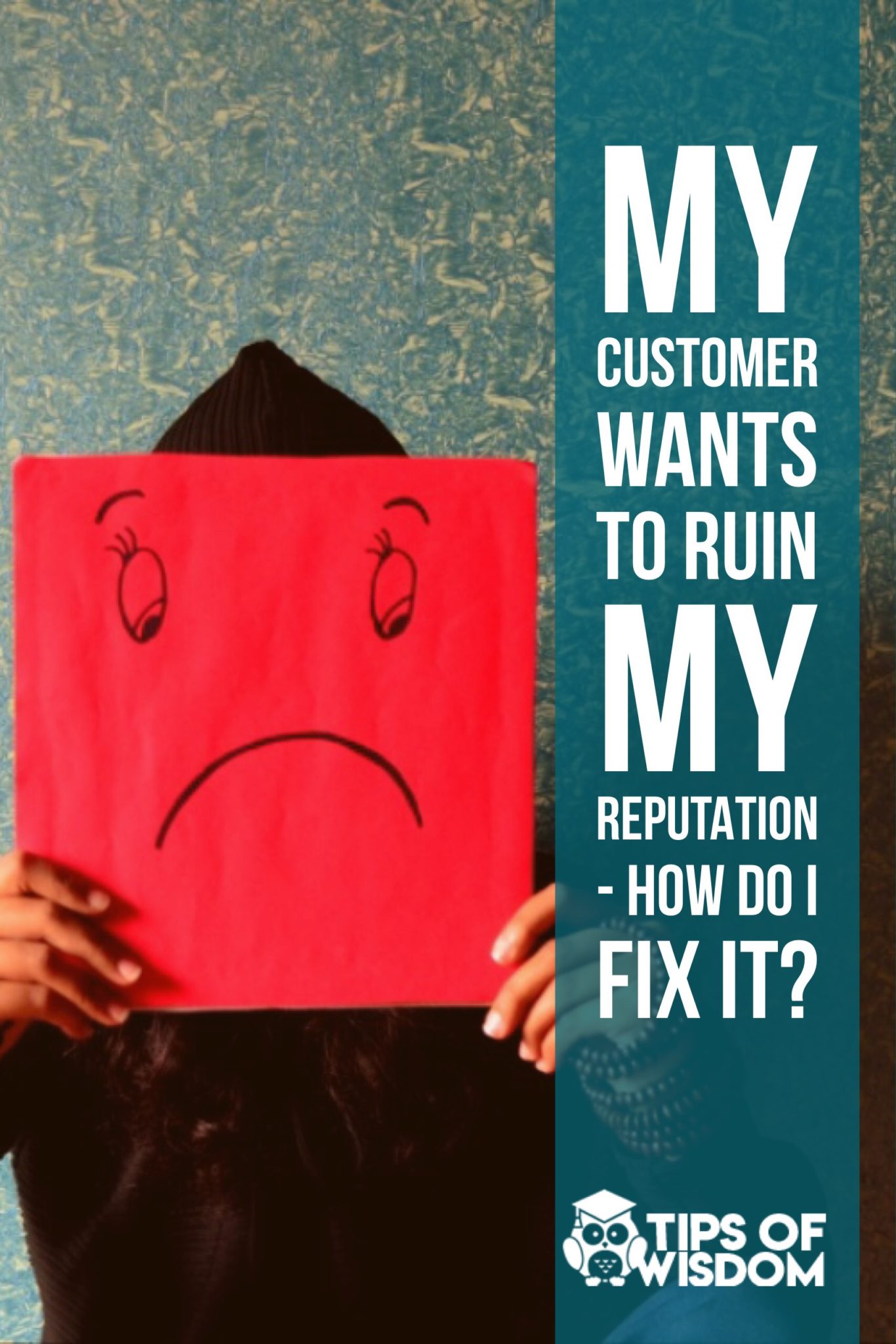Did you know there are some businesses who live to get customer complaints? Before we delve into why you should adopt a similar mindset, let’s look at why a business exists.
In the business world you fall into one of two categories: Owner or Operator.
If you’re the owner, you opened your business to provide a service or product you believerd the world needed. You poured your heart, soul, and maybe even your life’s savings into bringing your idea into fruition to serve the needs of others (and make a profit).
If you’re the operator, you get out of bed every day and head into work with the goal of helping your company achieve great things to serve the customers who need your products. You’re the most important piece to the puzzle in the space you’ve been selected to fill at your job. When all of the puzzle pieces are performing properly, you’re part of an amazing business team.
Each of the roles listed had a key word in them … SERVE. No matter the role you play in the business world, we each have one job to do above all others. We must serve the needs of our paying customers.
This is why customer complaints are a good thing for your company – assuming you have a process in place to fix, address, and learn from each complaint.
Let’s look at the elements to the process you should implement to make customer complaints a highlight of your business.
Create a “We Celebrate Complaints” Culture
No matter how great you are at what you do, there will always be customers who find something they don’t like about your business. The greater you become, the greater the likelihood of getting a complaint. That may sound counter-intuitive, but it makes sense. The more people expect from your business, the more likely they are to find fault in little things.
Your goal as a business owner and as an employee should always be to create raving fans. These are people who are so impressed by what you do, that they want to tell everyone about your business. They are also the people who will hold your business to a higher standard when you fail to live up to their expectations.
If you create a culture of excellence within your business, your employees will appreciate it when a complaint comes in because they will recognize people are giving them an opportunity to fix a problem area.
Address Quickly
When you receive a complaint, time is of the essence. We live in a world of instant gratification, combined with instant access to share news with hundreds of people in seconds.
Studies have repeatedly shown a happy customer may tell someone else about your business, but an unhappy customer will tell at least 12 other people about the experience at your business – not counting all their friends on social media.
So when you receive a complaint, work to mitigate the damage from it quickly. Ensure you have a system setup that allows the proper channels to be notified and to respond to the complaint. In a perfect world, complaints would be heard as soon as they come in and resolved within an hour of being brought to the attention of someone on your staff. At minimum, they should be resolved within 24 hours.
Your customer should be kept abreast of a realistic timeline if you aren’t able to fix the problem immediately. Let them know it will be three days or three weeks before you can fix the error, and then meet the deadline you set early.
Find Issues Before They Are Brought to Your Attention
Creating a culture of excellence can help you find mistakes before they happen. If your employees do something wrong, or if they encounter a customer who isn’t happy, they should be empowered to fix the problem. In order to make this happen, your employees need to be trained on what level of mistakes they can fix themselves, what the boundaries and budgets are for fixing mistakes, and when to turn a mistake over to someone else higher up the management chain.
I once worked with a marketing automation software supplier whose software wasn’t working properly for me. I spent over an hour on the phone with their tech support before I had to get off the phone to drive a family member to a chemo treatment. I explained to the customer support tech how critical it was we get the problem resolved. She told me she would continue working on it. Every hour, I received a personal email update from her on the status of the issue. When it was finally resolved, she also let me know of two other issues they found with our system setup that would’ve caused us problems. They had found mistakes before I did, fixed them, and brought it to my attention.
Then the extra “wow” happened. Three days later, I received a card and a small “hope” plaque in the mail for my family member. The card apologized for the tech issue and wished my family member well in the battle against cancer.
Listen Completely to the Complaint
In the course of my career, I have been responsible for listening to and addressing more than 200 complaints from unhappy individuals. Only a handful of the complaints were serious in nature. The majority of the complaints were easily fixed by doing one thing … listening empathetically.
It may be hard to believe, but sometimes all people want is someone to acknowledge they felt wronged and to address the situation through training. Taking the time to listen with the intent of listening is often the best way to handle a complaint.
I found the easiest way to achieve success in this arena was to assume each person speaking with me about a complaint was my mom or dad. I gave each person who called the same respect I would give my parents as I listened to their concerns. Once the concern was addressed, I would often write a handwritten note thanking the individual for bringing the problem to our attention, reiterating the steps we would take to solve it. Then I would include one extra sentence, “My personal cell phone number is XXX-XXX-XXXX. Should you ever feel unhappy with your service again, please call me immediately.”
I have only received one call to my cell phone in more than a decade of sharing my cell phone number, and I am glad I did. Instead of losing a customer for life because of two strikeouts in a row, we created a raving fan who saw a company whose core belief system was founded on customer centric principles.
Focus On the Solution
Another key to success in managing customer complaints is finding a way to get to the solution quickly. As you listen to a customer’s concerns, you should be focused on what they hope the outcome will be. Then work within the parameters of your business to achieve the solution together.
As we just discussed, sometimes the solution is as simple as listening and addressing the issue through training. Sometimes you may need to issue a refund. Other times you may need to involve others in addressing the concern.
But your entire goal in managing the complaint process should be to shift the customers mindset from focused on the complaint to focused on helping you find the solution together. This simple shift in mindset can quickly change how a customer reacts throughout the process.
The Customer is Not Always Right
Finally, it is important for you to realize that not every customer is right for your business — which means not every complaint you receive is legitimate. There are some customers who, no matter what you do, will never be happy. There are some customers who thrive on making other people miserable.
Much the same as it is okay to fire a bad employee, you should know it is okay to fire a bad customer. This mantra, however, should not be your team’s rallying cry. At the end of the day, without customers, you have no business. But sometimes, your business is better off without some customers.
One of the best lessons I learned early in my career was the importance of ensuring your team knows you always have their back so long as they are doing the right thing. A customer should never be allowed to belittle one of your employees. Many companies have a customer code of ethics and an employee code of ethics. When a customer violates the principles spelled out in the code of ethics, you have two options. The first option is to politely educate them on why they are wrong. The second option is to fire them as a customer if they aren’t the right fit for your business.
They biggest key to successfully managing customer complaints is to recognize their benefit. I shifted my mindset about complaints many years ago and started calling them “constructive criticism”. It was a game changer for me. When every complaint is viewed as a learning and growth opportunity for your company, you’re well on the path to creating a culture of excellence.
Found this tip useful? Save it on Pinterest…

ABOUT THE AUTHOR
Tina Bell is the founder of TipsOfWisdom.com. She developed her marketing experience serving a variety of industries, mostly in smaller sized companies, where she was hired to build their marketing programs. These experiences provided her the opportunity to wear many hats and learn multiple facets of marketing. She spent over six years in medical marketing, helping build an urgent care business from two urgent care clinics to over 13 clinics in four states. In addition to being well versed in copywriting, grassroots and community marketing initiatives, Tina is a sought after speaker and regularly presents educational webinars. She was ranked the top speaker at the Urgent Care Association of America Conference and spearheaded the development of an online medical training newsletter before she left that industry to start her own consulting business.

